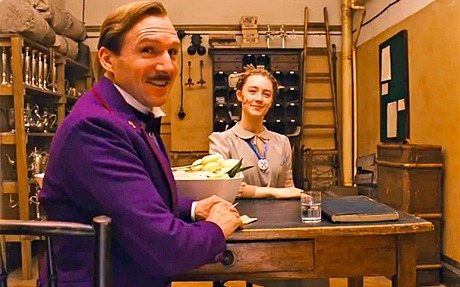A friend has seen Wes Anderson‘s Grand Budapest Hotel, which will debut at the 2014 Berlinale before opening stateside on 3.7 via Fox Searchlight. “Very Wessy from start to finish, but still very special, very touching and with a little more oomph than standard Anderson,” he begins. “Ralph Fiennes gives it a gravitas that Anderson’s movies have sometimes lacked. I’d rate it way above Moonrise Kingdom, which I quite liked also.

“Grand Budapest Hotel has all the playfulness and detached air that you’d expect from Anderson,” he explains, “but at the same time I felt he’s pushing himself a little more, perhaps not out of his comfort zone but at least he’s stretching within his realm.
“The specter of 1930s fascism looms over the whole affair. Most of the film plays in a fantasy Europe of the early 30’s, but Anderson addresses fascism and impending war without making a film about it. (The ‘S.S.’ is called ‘Z.Z.’ as in ‘zig-zag organization’, for example.) The film is a flashback within a flashback within a flashback — a strategy which gives Anderson the opportunity to show how the once grand hotel has gone to the dogs under communism over time.
“And there is something quite tragic about the two heroes. You could call it a film about loss and grief, in a way.” He didn’t mention who the other hero is besides Fiennes’ “Gustave H.” F. Murray Abraham‘s “Mr. Moustafa”?
“Budapest opens on a girl in the present visiting the grave of a writer who wrote a book about the titular hotel. When she opens the book the film flashes to the writer (Tom Wilkinson) addressing the audience in the ’80s about the difficulty of writing the book. Then it switches to the ’60s when the writer (now played by Jude Law) gets to know the owner of the hotel, who begins to tell him the story of how he came to own it.
“When the movie switches to the 30’s Anderson changes the aspect ratio to 1.33:1, which is pretty much the ratio of most all of the film (during the final minutes he even switches to black and white).
“It’s all done with a lot of love, and the whole flashback scenario actually pays off quite nicely in the end when the narrative flashes forward to the present. I will say no more.”












